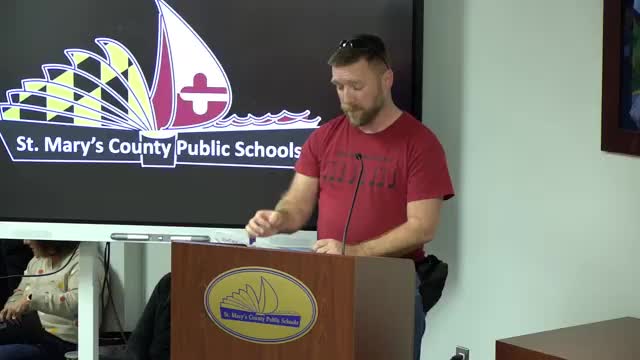Proposed A–D elementary special schedule draws large public opposition; district opens feedback period
Get AI-powered insights, summaries, and transcripts
Subscribe
Summary
District staff presented a proposed four‑day cohort schedule that would require most third‑ through fifth‑grade students to choose a single music option; dozens of teachers, students and parents urged the board to preserve pull‑out music, media and other "specials." District will accept feedback through March 31 and has not taken action.
St. Mary's County Public Schools staff on March 26 publicly released a proposal to move elementary schools to a four‑day cohort special‑area schedule (A–D rotation) that would require many third‑ through fifth‑grade students to choose a single music option rather than participate in multiple ensemble and general‑music opportunities.
Presenters described the change as a way to equalize special‑area minutes across schools and reduce the number of itinerant staff rotating between buildings. Under the proposal, third graders would choose general music or orchestra; fourth and fifth graders would choose general music, band, orchestra or chorus. Staff said the model would be phased in over three years and that principals would be able to see draft schedules; the district will collect public and staff feedback through March 31 before presenting a refined plan.
The public comment portion of the meeting turned into a near‑uninterrupted chorus of opposition. Dozens of teachers, media specialists, music educators, parents and students described the proposal as a threat to programming they said is essential for literacy, social‑emotional development and student engagement. Identified concerns included loss of pull‑out small‑group instruction, fewer opportunities for students to try multiple ensembles before middle school, reduced time for library programming and the impact on students who rely on specials as a safe, successful experience.
Michelle Smith, media specialist at Mechanicsville Elementary, said the proposed A–D schedule “would limit access, weaken programs, and hurt all students,” and she warned that inconsistent weekly media days would reduce book circulation and equity of access. Renee Campbell, a Piney Point Elementary music teacher of more than 30 years, said pilot changes already implemented this year in some schools produced disciplinary and scheduling problems; she urged the board to stop the changes and “sit down and discuss the concerns” before adopting any systemwide change.
Music educators and students described concrete academic and attendance benefits tied to consistent, frequent music instruction. Nathan Early, an elementary music teacher, said the current pull‑out model can produce “no statistically significant negative effects on overall student academic achievement,” and that research supports maintaining pull‑out music instruction. Student speakers, including fifth‑grade and middle‑school performers, described the emotional and social value of music and arts exposure.
Presenters explained some operational details: the current 10‑day rotation typically gives PE and music three sessions per 10 days, art and media two sessions; the proposed cohort model would provide roughly equalized frequency across specials (three sessions in a 12‑day cycle). Staff acknowledged that a cohort model implemented exactly as presented would limit some students from taking multiple music offerings and said the district will consider scheduling and curriculum changes to try to preserve critical experiences. The district also proposed an itinerant strings specialist model and placement of media clerks by enrollment and program need.
Board members and staff said they would review survey responses and meeting feedback, analyze staffing implications and return to the board with a revised recommendation. There was no vote on the scheduling proposal; it remained an informational item and staff said they will synthesize input gathered through March 31 before moving forward.
